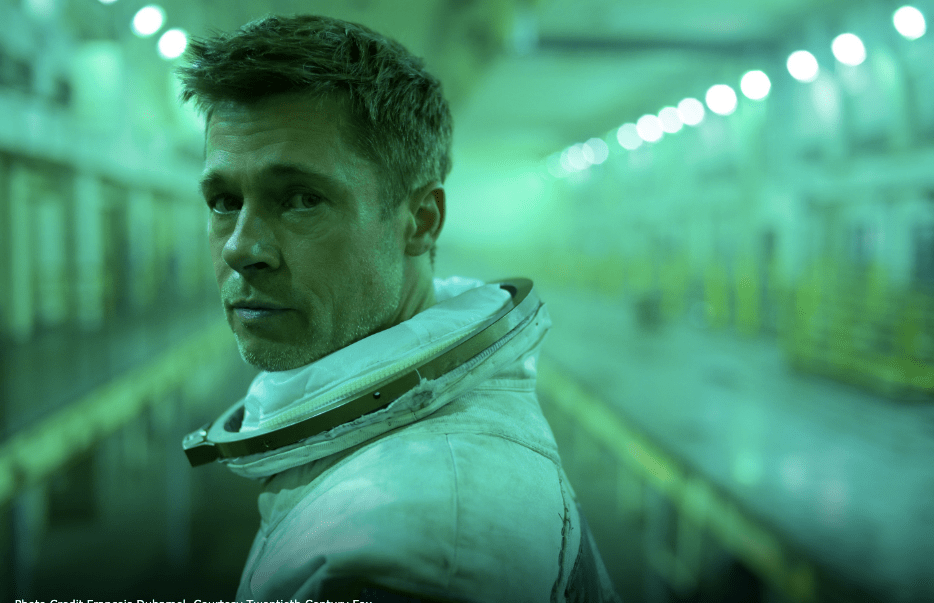
The opening scene of Ad Astra bears the mark of a master as it conveys all its most essential information in the span of only a few minutes. Brad Pitt narrates his psychological evaluation and we get flashes of his ex-wife (Liv Tyler) before he steps into the terrifying endlessness of space. Suddenly, catastrophe strikes. A chaotic electrical surge strikes the antenna and people die as he is powerless to save them. In a sequence of stunning visuals and riveting perspective, Pitt is struck from the platform himself and falls hundreds of thousands of meters to earth.
Psychological wellness, emotional attachment and the danger of space travel are at the nexus of Ad Astra‘s story and structure. That director James Gray can so easily make them both the film’s prologue and inciting incident is a testament to the talent and skill at his disposal.
When the camera seamlessly moved over Roy McBride’s (Pitt) shoulder to a 90º angle straight down, I was awestruck. By the time he landed on Earth, the film had me hooked. Rarely ever do films open so confidently, and rarer still do they sustain that confidence throughout with such consistent proficiency of craft.
McBride’s odyssey across the solar system is as cynical an outlook of humanity as it is an exploration of personal trauma. Tasked with connecting with his presumed-dead father, Clifford (Tommy Lee Jones), and destroying his search for extraterrestrial life to save the human race, Ad Astra is as much about Roy’s journey as it is his destination. Across billions of miles, humanity’s commercial enterprises and military pursuits have brought civilization beyond the limits of possibility. Roy encounters a star-studded supporting cast as he navigates his way across the solar system of the future. But what gets clearer as he does so is that the further that humankind spreads across space, the less empathy, compassion, and humanity there is to be found. People die all around him and are forgotten almost immediately. As Roy becomes more desperate and unpredictable in the pursuit of his mission, the film conveys the sense that Roy’s journey is echoing Clifford’s possible descent into madness.
The question at the film’s heart lies in whether Roy’s interest in his mission is more for the good of humanity or as a personal quest for closure. That question becomes more nuanced as the details of Roy and Clifford’s relationship become clearer. The film’s tagline “the answers we seek are just outside our reach,” looms over it like a curious omnipresence. While answers are what drive Clifford and Roy in their respective missions, the critical distinction is in their ability to accept them. The marriage Gray successfully creates between the unknowability of humanity’s place in the universe and Roy’s processing of grief and trauma is its strongest narrative component.
Gray’s film owes a lot of its iconography to dozens of sci-fi films that have come before, but it most closely resembles a riff on Apocalypse Now. It tells a gripping episodic story of character development and psychological burdens in which the military hero at its center emerges a fundamentally changed person from who he was at the start. Confined to a tight two hours, it is incredible how much precision, beauty, and thematic storytelling Gray can pack into it without over-stuffing or over-explaining.
The only over-explaining is in the use of Roy’s periodic psychological evaluations. As a narrative device, this was used a few too many times, as though it were playing to the very back of the room. It is the most overt aspect of the film — especially when Pitt’s voiceover narration can fill in those blanks itself. But even that at least delivers a satisfying payoff, book-ending Roy’s character development at the end of the film. The film’s efficient run time does also occasionally work against it, as a handful of significant developments rely heavily on the audience’s affinity for reading between the lines where a more leisurely pace is needed.
Ad Astra is everything we should ask for from modern science fiction. It sacrifices neither its story nor its spectacle and delivers visuals and ideas never seen quite this way before. It manages to feel incredibly intelligent without being too condescending to its audience. Pitt’s subdued performance is one of his best, and Hoyte Van Hoytema’s cinematography gives the film its sleek and realistic atmosphere. The technical mastery on display from James Gray cements him as one of the most ambitious directors working today and champions the power of original storytelling. Ad Astra deserves as much support as it does analysis. It is films like this that remind me why I love movies.


Comments are closed.